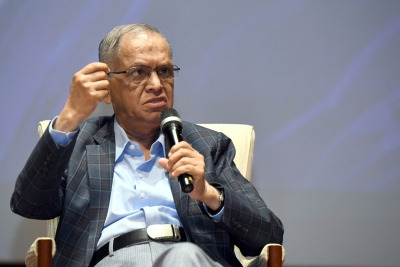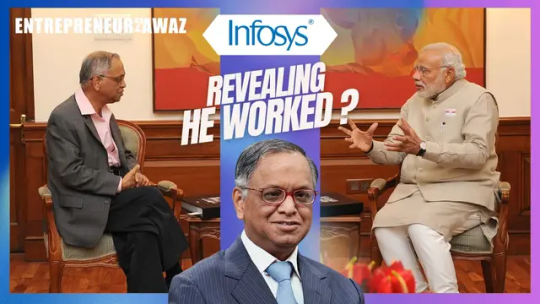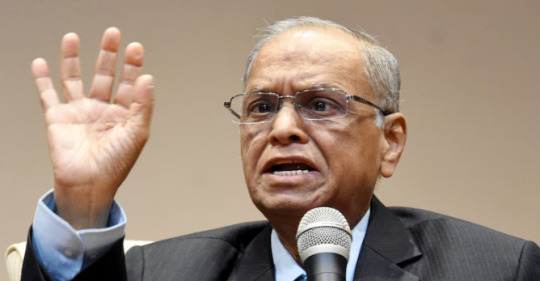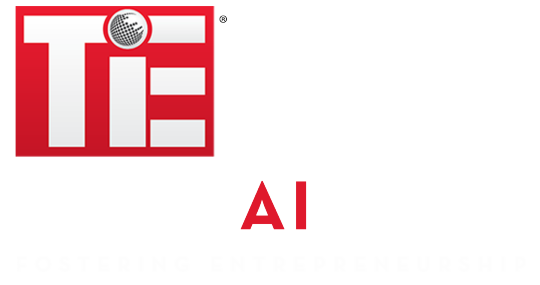#Narayana Murthy of Infosys
Explore tagged Tumblr posts
Text
'ChatGPT Boosts My Productivity’: Infosys Co-founder Sees AI As An Assistant, Not A Threat
Last Updated:June 19, 2025, 07:03 IST Infosys founder NR Narayana Murthy believes AI will drive growth in India’s IT sector. AI Will Drive IT Growth, Says Infosys Founder NR Narayana Murthy (File Photo) Infosys founder NR Narayana Murthy has expressed strong confidence in artificial intelligence (AI), asserting that it will drive the growth of the Indian information technology (IT) sector,…
#AI in IT sector#AI-driven growth#Artificial intelligence#ChatGPT#Indian IT industry#Infosys#job creation with AI#NR Narayana Murthy
0 notes
Text
Narayana Murthy defends 70-hour workweek concept again, calls on youth to work hard

Infosys co-founder Narayana Murthy has reiterated the call to work 70-hour a week, urging young people in India to work hard for the country’s growth.
Source: bhaskarlive.in
0 notes
Text

Infosys Co-founder on His 14-Hour Daily Work Schedule
In a recent interview, N.R. Narayana Murthy, the 78-year-old co-founder of Infosys, revealed that he worked 14 hours a day, six-and-a-half days a week for 30 years. His rigorous work schedule lasted until his retirement in 2011 at the age of 65. He would arrive at the office at 6:20 a.m. and leave at 8:30 p.m., a routine that he expressed being "very proud" of.
Founded in 1981 with six co-founders and just $250 in capital, Infosys has transformed into a global IT giant with a presence in 56 countries, including the United States. Today, the company employs over 317,000 people, making it one of the largest and most successful IT firms worldwide.
Infosys made history in 1999 when it became the first Indian company to be listed on NASDAQ. The company now boasts a market capitalization of more than $92 billion, with fiscal year 2024 revenue exceeding $18 billion, cementing its position as a leader in the global tech industry. Read More
0 notes
Text
0 notes
Text
Narayana Murthy Was "Disappointed" When India Shifted To 5-Day Workweek
Infosys co-founder Narayana Murthy has defended his controversial 70-hour workweek comments and added that hard work is crucial to India's progress. “I am sorry, I have not changed my view. I will take this with me to my grave,” Mr Murthy said at the CNBC Global Leadership Summit.

The veteran entrepreneur said he was “disappointed” with India's shift from a six-day workweek to a five-day workweek in 1986. Mr Murthy also said that India's development requires sacrifice, not relaxation.
Drawing attention to Prime Minister Narendra Modi's 100-hour workweeks, he said, “When PM Modi is working that hard, the only way to show our appreciation for what's happening around us is by working just as hard.”
He pointed to the example of post-WWII Germany and Japan, suggesting India follow a similar path of hard work and national rebuilding. “This is what they did to rebuild their countries,” Mr Murthy noted.
Mr Murthy also shared personal insights into his work ethic, revealing that throughout much of his career, he maintained an intense schedule of 14-hour days, six and a half days a week. He would arrive at the office by 6:30 am and leave at around 8:40 pm. “I'm proud of it,” he said.
The 78-year-old entrepreneur firmly believes hard work is the only path to success. “We need to work hard in this country. There is no substitute for hard work. Even if you are the most intelligent guy you have to work hard.”
To improve the delivery of public services, Mr Murthy had a suggestion for PM Modi. He proposed that the government consider hiring more managers with formal training over administrators selected through the current civil services examination system.
Once a candidate is selected, he or she will be taken to Mussoorie (where the Lal Bahadur Shastri National Academy Of Administration is located) for training, where he or she will be trained in specialised sector agriculture, defence or manufacturing, which is a departure from the current practice of creating general administrators, he said.
The successful candidates will become subject matter experts once the training is over and serve the country in their respective fields for 30-40 years, Mr Murthy said.
0 notes
Text
Sudha Murthy's Vision for Women & Tourism
Share your thoughts on Sudha Murthy's vision for India. What resonated with you the most? Let's continue the conversation.
A Grave Concern: Cervical Cancer in IndiaSudha Murthy YouTube VideoEmpowering Women Through Health InitiativesUnveiling India’s Hidden Treasures: A Vision for TourismRemarkable Women of the Maratha EraA Life Dedicated to Service: Sudha Murthy’s LegacyA Vision for a Better India Image Courtesty – Sansad TV. Sudha Murthy ‘s Maiden Speech: A Vision for Women’s Health and Untapped Tourism Potential…
#cervical cancer#culture#empowerment#heritage#India#Infosys Foundation#Inspiration#Narayana Murthy#Rajya Sabha#speech#Sudha Murthy#tourism#travel#women&039;s health
0 notes
Text

bro. cmon. are you fucking kidding me
NARAYANA MURTHY WHAT
3 notes
·
View notes
Text
UNDERSTANDING THE POWER OF VALUES AND BELIEFS
Discover how values and beliefs shape our daily decisions and behavior, and learn to decode what truly drives people—with real-world insights and practical tools.

Why We Do What We Do
Ever wondered why we make certain decisions—why we vote for a leader, support a brand, or react to a crisis the way we do? Much like the patterns on a cricket pitch shaped by the mower’s direction, our behaviors are shaped—quietly but powerfully—by the direction of our values and beliefs.
The Invisible Forces Guiding Us
We are a nation of cricket lovers. The feature that we hit upon straightaway when visiting a cricket stadium for the first time is the grass. Pruned to perfection, it exhibits stripes, diamonds, a checkerboard, or even arches.
Over the years we may have gathered many theories about how they are created: the grass is colored, has different lengths, and so on. But the real reason is a lot more naive. It’s the direction of the blades that tints the grass in various shades. When the sun hits an upright blade, its whole frame reflects the light–rendering it brighter than a blade that points directly towards the sun. Most professionals create the patterns by mowing in different directions. But the astute among them have another trick up their sleeve: they use a simple roller behind their mower to direct the blades with even more force.
And the same way the mowing and rolling directs the grass, our values and beliefs direct our behavior as humans. It is directed by internal patterns—the value-belief-attitude chain. Just like the groundskeeper uses a roller to shape the field, our values subtly but steadily guide what we say and do.
What Influences Our Behavior?
On the surface, most of our human behaviors do not seem rational. But if we follow these impulses down to their roots, everything starts to make sense.

It’s called the Value-Behavior Chain. Our Values influence our beliefs, which determine our attitudes that guide our behavior. That means if a business wants to influence its customers behavior, it must change their attitudes, beliefs or values first.
Values
Values are a measure of worth we attach to something. We can value something very little–meaning basically do not care. Or we can value someone a lot–going out of our way to do something for that person. Going even further, values often guide us between what is good and what is bad. Universal values are - for example- happiness, love, freedom, respect, equality and justice. But they can also be as specific as this:
One of my values is altruism: the fortunate should share their wealth with the less fortunate.
Case-In-Point: In 2022, Patagonia’s founder, Yvon Chouinard, transferred the company’s ownership to a trust to fight climate change. That act wasn’t about branding—it was about living a core value: environmental stewardship.
Reflection: What’s one core value that has consistently shaped your major life decisions?
Beliefs
A belief is a feeling that something is true. As a whole, our beliefs represent all the bits of information we collect about people, events and things in life. They do not necessarily have to be rational or based on facts. They can even be false beliefs and we still cling on to them. They grow stronger the longer we keep them and the more we keep repeating them to ourselves or others. Following our example chain, this could be a belief that is based on the value above:
I believe a good company donates some of their profits to charitable causes.
Case-In-Point: A belief might be “Businesses should give back to society.” Infosys co-founder Narayana Murthy embodies this belief through persistent philanthropy and CSR investment.
Try this: Write down three beliefs you hold about work, family, or society. Now ask: Where did these come from?
Attitudes
Our attitudes are based on our values (good and bad) and our beliefs (what we know). And they express our relationship towards the world around us. Based on what we value and believe, we like something or dislike it. Or we are ambivalent. An example of an attitude in our chain might be:
I like TATA cars because they help people in need. They donated a huge sum of money to The Prime Ministers’ Relief fund.
Case-In-Point: Many people admire Tata Group not just for its cars or hotels, but because of its consistent support for communities in need—especially during the COVID-19 crisis. That admiration is an attitude, built on a belief in social responsibility.
Behavior
Our behavior is simply what we do and say–our words and actions. Based on the attitude above, the chain would be concluded through the following behavior:
I Buy TATA Cars.
Case-In-Point: Choosing to buy from a brand like Body Shop or Forest Essentials often stems from valuing sustainability, believing in ethical sourcing, and feeling positively toward eco-conscious companies.

Visualizing the Connection
Imagine a buoy anchored to the ocean floor. The buoy (our attitude) rises and falls with the tide (life’s circumstances), but it remains tied to the anchor (our values) via a chain (our beliefs). Behavior, in this metaphor, is the ship that sails in response to these markers.

Our attitudes are like buoys. Like the ground, our values will rarely change. Depending on the tide–the circumstances in our life-the buoy will go up and down.
Meaning our attitudes will adapt to what’s happening to us. But they will always depend on our beliefs, as these can be stretched only so far before they break. The only missing piece in the picture is our behavior. Not hard to guess, they are the ships which are guided by the buoys.

As soon as we dive below the surface, people are a lot more rational than they often seem. In fact, their behavior becomes quite clear when we take their motives into account:

And once we know their motives, getting them along becomes as easy as creating a perfectly shaped checkerboard on a cricket field.
Why This Matters
Whether we’re shaping classroom culture, guiding a team, parenting, or building a business, understanding the value-belief-behavior chain helps us align better with others—and with ourselves. When we notice what truly drives people, we can build trust, shift attitudes, and inspire action with clarity.
In leadership, brands like Microsoft under Satya Nadella or social movements like the MeToo resurgence in India show how aligned values and consistent behavior foster real transformation.
Final Thoughts
Values and beliefs aren’t abstract ideas—they’re the invisible rollers that direct the “blades” of our daily actions. When we trace behaviors back to their source, the world—and its people—start to make much more sense.
Content Curated By: Dr Shoury Kuttappa

#Motivation#MindsetShift#SelfAwareness#EmotionalIntelligence#DecisionMaking#PersonalGrowth#ConsciousLiving#ThoughtLeadership#HumanBehavior#drshourykuttappa
0 notes
Text
At Just 18 Months, Ekagrah Murty Bags Rs 6.5 Crore From Infosys Shares: Report | Economy News
New Delhi: Grandson of Infosys co-founder Narayana Murthy, Ekagrah Rohan Murty at just 18 months old has already earned Rs 6.5 crore in dividends, according to a Times of India report. The windfall comes from shares worth over Rs 240 crore that were gifted to him by his grandfather when he was just four months old. This gave the toddler a 0.04 per cent stake in Infosys, one of India’s biggest IT…
0 notes
Text
Expert explains why Narayana Murthy's 70 hours/week working policy might be healthy
Infosys co-founder Narayana Murthy sparked a nationwide debate when he suggested that young Indians should work 70 hours a week to boost the country’s productivity. His remark, made during a podcast, quickly went viral, drawing both support and criticism.Murthy’s point? He believes that if India wants to compete with global economies like China and the U.S., young professionals need to put in…
0 notes
Text
"Most So-Called AI Things Are Silly, Old Programmes": Narayana Murthy
Infosys co-founder Narayana Murthy has said it has “become a fashion” in India to talk about artificial intelligence (AI) for everything, emphasising that most “so-called AI things are silly, odd programmes”. Speaking at a TiEcon Mumbai 2025 event on Wednesday, Mr Murthy said, “I think somehow it has become a fashion in India to talk of AI for everything. I have seen several normal, ordinary…
0 notes
Text
Treat employees as humans, reduce gap between highest and lowest salaries: Infosys founder Narayana Murthy
Source: Moneycontrol
https://search.app/L7oNU
No government or organisation can tell rich and prosperous people to help society or unequals for their own interest.The interest should be clear an extremely unequal society is bad for the health of society and result will show in physical parameters oozing out of society,it's economics and politics...
Shared via the Google App
1 note
·
View note
Text
Industrialist Harsh Goenka recently stirred a lively online discussion with his post on X about Bengaluru’s rapid growth. Sharing a photo of Infosys co-founders Narayana Murthy and Nandan Nilekani, [ad_2] Source link
0 notes
Text
Industrialist Harsh Goenka recently stirred a lively online discussion with his post on X about Bengaluru’s rapid growth. Sharing a photo of Infosys co-founders Narayana Murthy and Nandan Nilekani, [ad_2] Source link
0 notes
Text

TiE Mumbai to Host the Prestigious 'Hall of Fame' Awards at TiEcon 2025
March 07, 2025, Mumbai – The Indus Entrepreneurs (TiE) Mumbai is set to host the much-anticipated 'Hall of Fame' Awards at TiEcon 2025, a premier event that recognizes exceptional contributions to entrepreneurship, investment, corporate leadership, and public service. This will be held on March 12, 2025, at the prestigious Jio World Convention Centre. BKC - India's largest and first state of the art Conference and Exhibition center. These prestigious awards will recognize and honor outstanding entrepreneurs, investors, investment bankers, corporates and government change agents who have significantly impacted the Indian and global economic ecosystem.
The Chief Guest for the TiE Mumbai’s Hall of Fame Awards will be Mr. N. R. Narayana Murthy – Founder, Infosys, who will grace the occasion and celebrate the remarkable achievements of innovators and wealth creators.
Speaking about the awards, Ranu Vohra, President of TiE Mumbai, said, “Entrepreneurship is the backbone of India’s economic growth, and it is essential to recognize and celebrate the pioneers who are driving meaningful change. TiE Mumbai’s 'Hall of Fame' is a tribute to those who have dared to innovate, build, and create lasting impact in India and beyond.”
"The TiE Mumbai Hall of Fame Awards celebrate the spirit of entrepreneurship and the trailblazers who redefine industries, create opportunities, and inspire future generations. As we honor these visionaries, we reaffirm our commitment to fostering innovation, collaboration, and impactful change in India's entrepreneurial landscape.” said Apoorva Sharma, President Elect, TiE Mumbai and Co-Founder, Venture Catalysts & 9Unicorns.
Mohit Joshi, CEO, Havas Media Network India, added “At Havas Media Network India, our partnership with TIE has been built on a shared commitment to fostering entrepreneurship and driving meaningful conversations within the business ecosystem. Over the years, we have collaborated on initiatives that spotlight innovation, leadership, and growth, and we are thrilled to continue this association. This year, as the Hall of Fame partner at TIE Mumbai, we look forward to further strengthening our engagement and contributing to a platform that recognizes and empowers visionary entrepreneurs.”
This year’s awards will recognize high achievers and visionary individuals and institutions that have driven innovation, disrupted norms, and generated impactful value, contributing to economic and social progress.
Categories of Recognition
TiE Mumbai will present awards across various categories, including –
Pioneering Unicorn Investor – Recognizing visionary investors who have played a key role in funding and nurturing startups that have achieved unicorn status
Catalyst of Startup Ecosystem and Innovation – Celebrating individuals who have significantly contributed to fostering a thriving startup culture through mentorship, funding, or policy advocacy.
Pioneer in Building India’s Investment Ecosystem – Honoring leaders who have been instrumental in creating a robust investment framework, facilitating capital flow into promising startups and high-growth ventures.
Big Bull - Startup Pioneer Investor – Acknowledging investors with a sharp eye for identifying game-changing startups early on and supporting their journey
Transformative AI Startup in Customer Service – Recognizing a startup that has revolutionized customer interactions through cutting-edge AI-driven solutions,
Startup Power Couple – Celebrating a dynamic duo who have jointly built or significantly contributed to a thriving startup
Resilient Turnaround Company - Recognizing a remarkable journey in overcoming challenges, demonstrating resilience, and successfully revamping its business model for sustained growth.
Igniting the Tech Scene in Mumbai – Honoring startups, that have played a pivotal role in positioning Mumbai as a key technology and innovation hub.
High-Growth Catalyst Investor – Acknowledging investors who have actively fueled high-growth startups, accelerating their scale-up journey with strategic investments and guidance.
Innovator in Logistics Excellence – Celebrating a startup or company that has introduced groundbreaking innovations in logistics, improving customer experience.
Startup Catalyst Investor – Honoring investors who have consistently backed early-stage startups, providing them with the necessary capital, mentorship, and industry connections to scale successfully.
There are many more categories in addition to the above.
TiE Mumbai invites nominations from the ecosystem to recognize individuals and institutions that have made outstanding contributions to entrepreneurship, investment, and economic development. The TiEcon 2025 and the 'Hall of Fame' Awards promise to be a landmark event celebrating the spirit of entrepreneurship and innovation.
1 note
·
View note
Text
Transforming Indian Education for Global Competitiveness – Insights from Ashoka University Founders
India’s education system is at a crucial juncture, requiring significant transformation to enhance global competitiveness. Vineet Gupta, one of the Ashoka University Founders, highlights the urgent need for a paradigm shift in education, stating that fostering critical thinking, creativity, and problem-solving skills is essential for preparing students for the modern workforce. According to the Annual Employability Survey 2019 by Aspiring Minds, 80% of Indian engineers lack the skills needed for the knowledge economy, with only 2.5% proficient in Artificial Intelligence (AI). This gap underscores the pressing need for industry-ready professionals.

Collaboration between educational institutions, industry leaders, and government bodies is key to bridging this gap. Sridhar Vembu, CEO of Zoho Corporation, emphasizes industry-academia collaboration to equip students with practical skills aligned with industry needs. Similarly, initiatives like the Atal Innovation Mission promote innovation and entrepreneurship from an early age. Infosys co-founder N. R. Narayana Murthy stresses the importance of shifting away from rote learning and fostering an entrepreneurial mindset to tackle real-world challenges.
Ashoka University’s approach to higher education reform exemplifies the need for innovative policies to equip students with globally competitive skills. As India aims to become a global leader, a reimagined education system focusing on creativity, critical thinking, and innovation is crucial. Stay updated with Indian Business Times for more insights on India's evolving education landscape.
#indian business times#all news updates#news website#news article#marketing#global news#news media#education news#economy#finance
0 notes